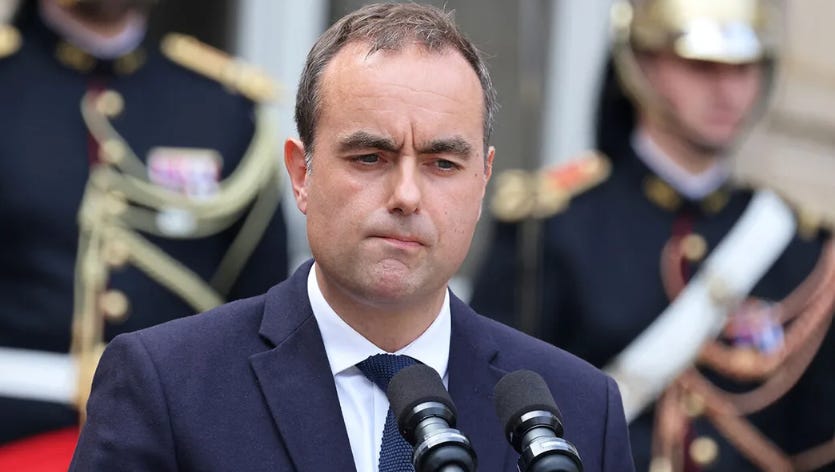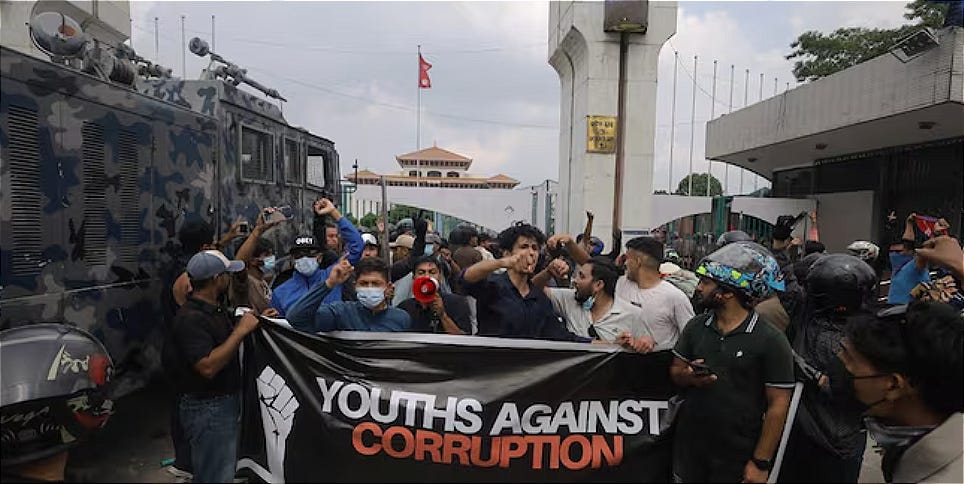Is France Paying a Financial Price for its Political Instability? Nepalese GenZs Oust Prime Minister in Intense Protests, Political Violence Hits New High in the US, and More
Grinfi Political Risk Intelligence Briefing
Welcome to this week’s edition of Grinfi Political Risk Edge, your trusted source for expert political risk analysis and strategic intelligence. Thorough, insightful, and industry-focused. In this issue, we examine key geopolitical events shaping global markets and provide deep, beyond-the-headlines assessment. We deliver clarity in uncertainty and strength in decision-making. Anticipate, Adapt, and Excel!
But first, read our latest policy brief on the proposed Modernization of Military Service Act, as the Bundestag prepares for debate and Germany confronts the politically thorny issue of (mandatory) conscription, which pits the younger generation against their older counterparts.
Now, let’s begin the week with a laugh 😄 to brighten the mood.
Help us serve you better and improve Grinfi Political Risk Edge by taking this brief, fully anonymized reader survey.
"Kings had need beware how they side themselves, and make themselves as of a faction or party; for leagues within the state are ever pernicious…. for they raise an obligation paramount to obligation of sovereignty, and make the king ‘tanquam unus ex nobis’... When factions are carried too high and too violently, it is a sign of weakness in princes, and much to the prejudice both of their authority and business."
Francis Bacon, The Essays, or Counsels, Civil and Moral. Essay I: “Of Faction.” First published 1597; enlarged 1612; final edition 1625.
Disclaimer: The opinion expressed in this quote does not represent our views but is intended for reflection purposes only.
From Grinfi Political Risk Observatory (GPRO), here’s what we’re monitoring:
High Impact Situational Updates
EXECUTIVE SUMMARY
Last week, several strategic events reshaped the global risk environment with direct consequences for security, markets, and regulation.
“At Grinfi, we track immediate/direct fragility and systemic contagion (cascading effect), ensuring leaders see risks before they spread.”
In the United States, political violence rose sharply last week with the assassination of conservative activist Charlie Kirk during a campus event in Utah. Federal authorities confirmed the arrest of a suspect. This follows the June 14 killing of Minnesota Democratic State Representative Melissa Hortman and her husband in another politically motivated attack.
The government condemned public displays celebrating Kirk’s murder, and the State Department announced that foreign nationals who glorify the killing could face entry bans. Critics accused the administration of selective outrage, noting past instances in which senior Republican figures mocked left-leaning victims of violence, including a celebratory meme posted by Donald Trump Jr. after the 2022 hammer attack on Paul Pelosi. A YouGov poll conducted September 10–12 found that most Americans disapprove of celebrating the death of political opponents, though a higher share of self-identified hard liberals expressed comfort with such reactions compared to conservatives and moderates.
The findings underscore a deepening cultural normalization of violence within U.S. politics.
Separately, the Pentagon is preparing to deploy up to 1,000 National Guard personnel to major crime-infested cities in Louisiana to reinforce local law enforcement, according to a leaked internal planning document revealed by the Washington Post. Washington also advanced a tentative thaw with Belarus after Minsk released 52 prisoners; the U.S. eased sanctions on Belavia and signaled plans to reopen its embassy.
In Europe, France’s fiscal and political fragility crystallized. Prime Minister François Bayrou was ousted following a no-confidence vote. Fitch downgraded France’s sovereign rating to A+, the lowest in its history (i.e. in Fitch’s rating), pushing ten-year yields to 3.47% and widening spreads over Bunds. At the same time, President Emmanuel Macron appointed 39-year-old centrist Sébastien Lecornu as Prime Minister on September 9, though he assumed office on September 10, coinciding with the nationwide Bloquons Tout (Block Everything) protests.

On September 14, Lecornu scrapped from the budget the controversial proposal to eliminate
End of Free Briefing
Become a paid subscriber today to gain complete and unrestricted access to the full briefing with detailed strategic takeaways, sector-specific action roadmaps, board-ready guidance (“What to Tell Your Investors or Board this Week”), and our comprehensive market summary, as well as the exclusive France-special section: L’observatoire Decisif...



